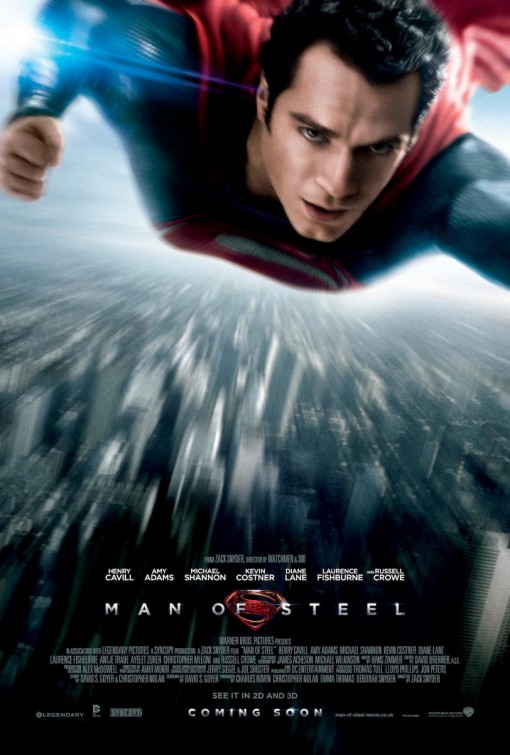
In the now 75 years that Superman has been an integral part of American popular culture, he has been a unifying figure, a symbol, a heroic shorthand, a yardstick, a standard of superheroic measurement. This makes Superman an incongruous notion in 2013, where it feels more impossible than I can remember in my lifetime to achieve any measure of consensus. In 2013, in a perpetual-information culture where every last one of us is bombarded every second of every day with hyper-partisan news reportage and a social media function for every last component of our lives, how can we possibly agree on anything, even Superman?
In a way, that makes MAN OF STEEL the perfect Superman movie for this harried, fractured, eminently confused human moment.
While opinions vary on the sequels to Richard Donner’s 1978 SUPERMAN: THE MOVIE, I’ve never heard anyone disparage that first film, which was a canny blend of good-old-fashioned American optimism, represented by Christopher Reeve’s winning performance as Clark Kent and Superman, set against an undercurrent of 1970s new-Hollywood cynicism, represented by Gene Hackman’s barky swagger as Lex Luthor. Hackman, as the recognizable star of THE FRENCH CONNECTION and THE CONVERSATION, paranoid, authority-challenging down-ending thrillers, served as a perfect counterbalance to Superman. Donner’s film contemporized Superman, which meant that the weight and the importance of the Big Blue Boy Scout was never clearer.
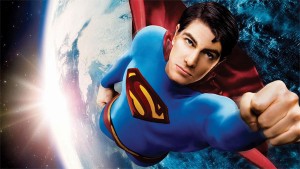
The same way that most everyone agrees on the virtues of the 1978 Superman, most everyone agrees that Bryan Singer’s 2006 SUPERMAN RETURNS was severely flawed. While hindsight has given due credit to Christopher-Reeve-a-like Brandon Routh for being a more-than-serviceable Superman, Singer’s film is too indebted to Donner’s films to work on its own merits. Singer recycles John Williams’ iconic score and treats SUPERMAN RETURNS as a sequel to Donner’s SUPERMAN 2. The storyline is cluttered with a love triangle involving a miscast Lois Lane and even throws in a Super-baby, all the while failing to update Superman for an America that, in the midst of a hopeless, George-Bush-Jr.-dominated era, truly needed him.
But if everyone can pretty much agree on SUPERMAN: THE MOVIE and SUPERMAN RETURNS, the exact opposite seems to be true of 2013’s MAN OF STEEL. In 2013, everybody gets an opinion. The internet has thoroughly democratized all discussion about films, and those who don’t write about movies professionally can start their own blog, and those who don’t bother to do that can still post comments to the sites of those who do, and meanwhile everybody and their parents has a Facebook or a Twitter or a Tumblr or some combination of the above. That isn’t to say this is resolutely negative – whether it’s good or bad is up to you. Either way, that’s just the reality of how things are now.
One of the internet’s most popular sites is Wikipedia, an aggregated reference website which anyone can update, within reason. As is the case with every film listed on the site, the Wikipedia page for MAN OF STEEL offers a section on the critical reception of the film. This might be a good place to look for an objective consensus, but of course, anyone can update Wikipedia, so the critical reception to MAN OF STEEL is determined by which critics were deemed representative by whoever compiled this entry. In this case, Wikipedia initially brings up Rotten Tomatoes and Metacritic, two sites which compile critics’ reviews and assign them number values in order to determine an average gradation. (Hardly a scientific process, though many accept it as such.) Both of those sites find MAN OF STEEL at around a 50-50 approval rating. Everyone can agree that no one can agree!
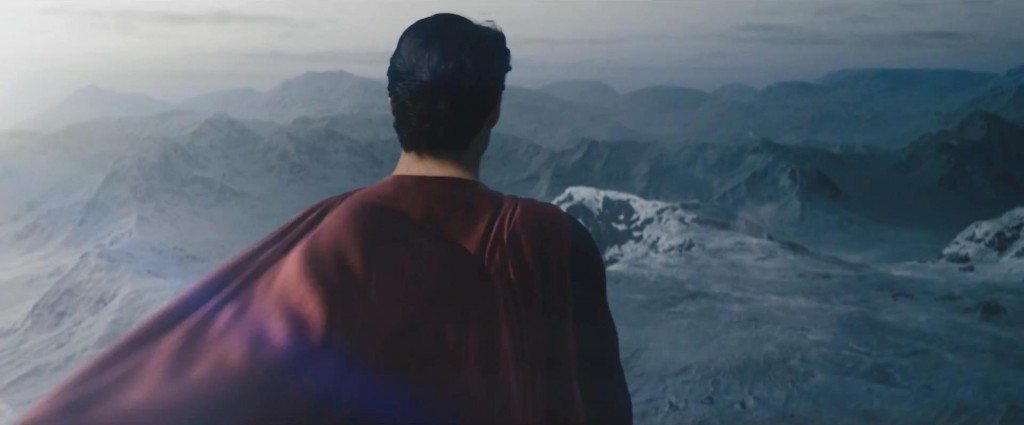
So, MAN OF STEEL: Either it’s the most awesome Superman movie to date, a triumphant trumpet blast down the Hall Of Heroes, or it’s the most awful of any of them, even SUPERMAN 4 – this one barely even qualifying as a Superman movie due to the violations of character. I’ve listened to both sides, and after thinking about it for far too long, I would like to ultimately posit that MAN OF STEEL sits astride both poles of the spectrum almost simultaneously: MAN OF STEEL has some of the most impressively current visual effects one might ever wish to see in a superhero movie. It clearly represents hours upon days upon weeks of work by a sizable army of very talented computer technicians and animators. It’s an impressive achievement.
It’s also a fucking headache to sit through even the one time.
Let’s start in microcosm, or macrocosm as the case may be, and talk about Hans Zimmer’s score to MAN OF STEEL, the film’s most pervasive element. Hans Zimmer’s sound has come to define the past two decades of blockbuster action movies, combining as it does electronic effects and enhancements with classical-sounding orchestral swells and dramatic choral arrangements. Hans Zimmer is the go-to guy for action films of this level of financial ambition and self-importance – his music is a reliable accompaniment to acts of heroic violence, as American as the Fourth Of July, which is of course very ironic for a composer born in Germany. After his punishing score for THE DARK KNIGHT RISES, it was little surprise that Hans Zimmer would be brought on board for executive producer Christopher Nolan’s next somber superhero dirge. Also composed by Hans Zimmer in 2013: The soundtrack to a miniseries called The Bible. That probably matters, but I’ll circle back around to that.
The score for MAN OF STEEL is rousing, exciting, like the thrill of thunder when you’re a kid inside, undercovers, during a storm. It’s also relentlessly present, throughout a film that tops out at around the middle of its third hour. The MAN OF STEEL score hammers away at your eardrums with an emotionally-violent sound, like the slam of the front door when Godzilla walks out on Mrs. Godzilla and little Godzuki. I’m not telling you anything you don’t know. He’s been doing this at least as far back as CRIMSON TIDE. But this time around, in addition to the standard voluminous strings and dozens-of-hallowed-angels-strong choral effects, Zimmer layers on that shitty electric guitar accompaniment he hasn’t used since BROKEN ARROW. A new, kooky spin on a reliably epic formula.
I love it. I hate it. It’s terrific. It’s terrible. It’s absolutely of a piece with the film as a whole. Simultaneously awesome and awful, often at the exact same time. I paid to download the deluxe version, by the way. I listen to it when I work out sometimes. This is full critical disclosure, in case you think some of these word choices are a little harsh.
The action of MAN OF STEEL picks up in media res, on the dying planet of Krypton, which appears to be both a fully realized world (awesome) and a place you’d never ever want to visit (awful). Everyone on Krypton dresses like Japanese beetles. Krypton is dying because of all the things Matt Damon warned us about in PROMISED LAND, but since nobody but me saw that movie, least of all billions of Kryptonians, their planet is utterly depleted and coming apart from the insides. The foremost Kryptonian scientist, Jor-El, is played by Russell Crowe, which means that Crowe is officially our generation’s Marlon Brando now. Jor-El and his wife Lara (not famous) are trying to save their infant son by sending him off in an adorable space shuttle. This story we know by rote; it’s the story of Moses Jesus Kal-El, who will one day become Superman. Opposing Jor-El is the head of the Kryptonian military, General Zod, who is played by Michael Shannon. Michael Shannon is one of the few aspects of MAN OF STEEL which is resolutely awesome – he’s one of the best actors working today and there’s no muffling his intensity, not even under what looks like 400 pounds of bug armor and KISS moon boots.
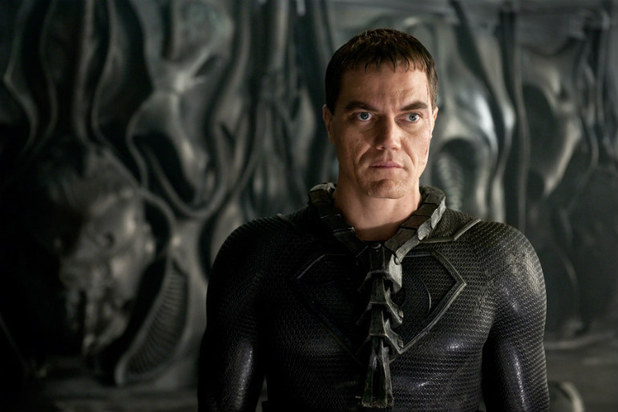
Michael Shannon may not be our generation’s Terence Stamp, since nobody’s that pretty, but he may yet be our Gene Hackman. There’s no new Lex Luthor in this movie so that’s fair for the moment. Have you seen Michael Shannon in TAKE SHELTER? You should, immediately. Anyway, there a scene in that movie where Michael Shannon goes totally apeshit – it’s galvanizing and volcanic and unforgettably powerful. Zack Snyder, director of MAN OF STEEL, essentially acted as a hip-hop producer when he sampled Michael Shannon’s performance in that one scene in TAKE SHELTER and basically put it on loop for this Superman movie. General Zod is a pretty one-note role but as played by Michael Shannon, think of it as that one note Hans Zimmer hit over and over in the INCEPTION trailer. WOMMMP! Michael Shannon gives one of the most ferocious performances you’ll ever see in a superhero movie. MAN OF STEEL, for all its noise and cataclysmic imagery, has the overall feeling of a tidal wave: Michael Shannon’s clenched jaw, furled brow, and furious glare are what stand strongest and most unmoved by the impact.
The movie takes a surprising amount of time before fully introducing its lead character. Producer Nolan and writer David Goyer, bolstered by the huge success of their Batman franchise, seem convinced that the audience needs to see a foundation of pre-adolescent trauma and pseudo-psychology before it gets to enjoy the spectacle of men in capes punching the shit out of each other. So we get the discovery of baby Moses’ basket in the reeds baby Kal-El’s space shuttle in the plains of Kansas, found by all-American Jonathan and Martha Kent, who are played here by Kevin Costner and Diane Lane and a more all-American-signifying pair of actors you’d be hard pressed to find. They raise the super-baby as their own son Clark. As envisioned by Snyder and filmed by Iranian cinematographer Amir Mokri, the scenes where young Clark discovers his supernatural Kryptonian powers are shot and lit for maximum drama and terror – there’s none of the lightness of touch present in the Donner version. These Superboy scenes culminate in trauma, where Clark loses his father to a tornado – Jonathan literally commands Clark to let him die when he could have saved him, out of fear that Clark’s powers would be discovered by a world that would fear and hate him. So then Clark leaves Kansas, wandering the far reaches of the globe, growing his beard out and mourning his father by hiding his light.
What Goyer, Snyder, and Nolan have done here is to create a Superman who is born of guilt. This is one reason why many Superman fans were so turned off to MAN OF STEEL. The character of Superman has traditionally been portrayed as hopeful and optimistic. Darker emotions such as guilt are the province of Batman and Spider-Man, not Superman. Also, guilt is a byproduct of religion, and one most often inhabited by the Jews and the Catholics. Bizarrely, considering that Superman is one of the great gifts to America of the Jews, courtesy of Cleveland-born creators Jerry Siegel and Joe Shuster, the MAN OF STEEL team choose to make Superman a Christ figure. He’s got the beard, and the father issues, and he is literally shown going to church to consult with a priest, and if that’s not enough, his age when Henry Cavill finally takes the stage to play him is given as thirty-three. Why are these religious signposts being added to the text of Superman if MAN OF STEEL is going to be such a dour affair? Beyond the fact that it goes against the universalism of Superman – he’s for all of us, not just one theological affiliation – it’s odd that this is such a dark movie, full of destruction, shot in metallic gray tones. Maybe THE PASSION OF THE CHRIST made a bunch of money but it was pretty much a bummer, no? If I gotta go to church I’m going with the Baptists. It’s way more fun to sing with the choir.
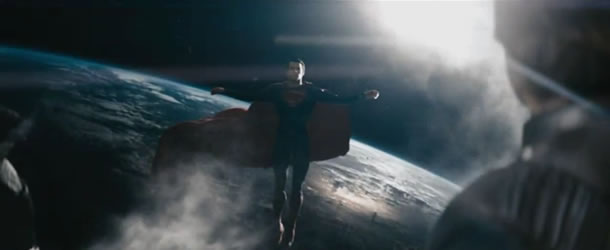
Henry Cavill makes a fine Super-Christ, I suppose. He’s more animated than Jim Caviezel, but then again so are rocks. Certainly every woman I know wants to have super-sex with Henry Cavill, but I’m not sure that’s a quality I personally look for in a Superman. There’s still no beating the mischievous sweetness Christopher Reeve brought to the role. Henry Cavill looks like diamonds could crack on his cheekbones, and he doesn’t embarrass himself throwing a punch, but he doesn’t warm my heart, and in the grand scheme that’s Superman’s job. The most exciting scene in the movie, where Clark finally cuts loose of his self-exile and starts enjoying his powers of flight, is more a credit to the visual effects department and the unprecedented sonic boom effects they create. But to be the classic it seems to be intended to be, this movie needed that excitement to come from the performance, not the VFX department.
The other key members of the cast are Amy Adams as intrepid reporter Lois Lane and Laurence Fishburne as stern editor Perry White. Both are actors everyone likes, and I’m no exception, although again from where I’m sitting, they have the feeling of strong, likable actors who happen to be in a Superman movie, not iconic renditions of well-known comic-book supporting characters. Again, we have examples of this working and this not working. In SUPERMAN: THE MOVIE, Margot Kidder as Lois has a weird, punchy chemistry with Christopher Reeve. In SUPERMAN RETURNS, Brandon Routh’s Clark seems like he might be a fair amount happier in love if he looked past Kate Bosworth’s Lois to see James Marsden standing there. MAN OF STEEL again lands in the middle – Amy Adams’ Lois seems convincingly attracted to Henry Cavill’s Clark, as apparently any woman would be, but it’s not quite clear what he sees in her, unless he recognizes that she’s played by Amy Adams who’s been greater in many other movies than she is here.
Sidebar on the topic of Superman’s hotness – was anyone else annoyed at the scene where a female soldier sees Supes and remarks “He’s hot?” Felt dismissive of women in uniform. Why not be 2013, be bold, and make that admiring soldier a guy? Otherwise, leave that dumb line out.
Once all of the main players are introduced, the plot of MAN OF STEEL is a bit of a blur. I do remember admiring its efficiency – the obligatory origin takes up the first half of the movie, it feels like, but then we get right down to catastrophe. General Zod and the remaining members of his Kryptonian death squad arrive on Earth and demand that humanity turn Kal-El over to him. Zod wants to rebuild Krypton on Earth, and he sets up a kind of space-fracking machine in the middle of Metropolis to get it done. There’s a ghost Russell Crowe floating around for a while there, but really this movie is in a big hurry to get to the lightning and the thunder. In a battle scene that takes up almost an entire act of the film, Zod and Superman slug it out, racking up what feels like an unprecedented amount of property damage.
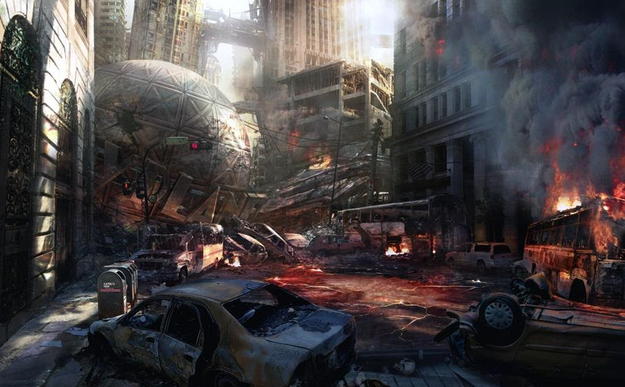
This is another bone of contention for Superman fans. The common argument goes that Superman should not have allowed such destruction to happen in a heavily-populated city. Just think, the fans argue, of how many innocent bystanders die in the collapse of buildings. These criticisms became so widespread that the makers of MAN OF STEEL were prompted to answer them. My own argument is: If the movie were truly hitting on all cylinders, no one in the audience would stop to worry about imaginary bystanders. Do we have such thoughts while watching THE AVENGERS? We don’t, because any one of those characters are more engaging and charismatic than Superman in MAN OF STEEL. We’re waiting to hear what clever quip they’re about to spout out, or what neat variation on their powers they’re about to use, and our minds and eyes are not wandering towards the surrounding buildings. But also, yes, it must be said, in THE AVENGERS we see the heroes putting forth an effort to rescue bystanders, as we do in the SPIDER-MAN movies, as we even do in the dour and mopey DARK KNIGHT RISES.
Superman should be the least self-involved hero of them all, especially with his new messianic complex, but that’s not how it plays in MAN OF STEEL. But maybe that makes him a hero of the moment after all, when self-obsessed reality stars, not movie stars, are our new celebrity idols, and the preponderance of social media invites unending cycles of self-examination and self-promotion which our grandparents could never have imagined and would never have indulged in.
MAN OF STEEL has a blunt force to it that makes it a memorable filmgoing experience, even if the individual scenes aren’t remotely as memorable. Spectacle is something Christopher Nolan has proved he can provide. I’m concerned that the witty, adventurous filmmaker behind MEMENTO and INCEPTION is now getting too involved as an engineer of gargantuan, ponderous big-studio machinery. It should be said that the partnership reflects well on Zack Snyder, because call it awesome or awful, MAN OF STEEL is probably his best movie to date. He’s a director with style. Is he a director with vision? The studio promotional departments keep trying to tell us he is, but try to remember that the one time he made a movie that wasn’t a direct adaptation of some other creator’s material, it was an uneven pastiche (SUCKER PUNCH). Here at least Snyder is an efficient executor of the Nolan/Goyer house style, with few unnecessary stylistic flourishes. I don’t ultimately think what resulted here is good for the world, but it’s Snyder’s most cohesive work to date.
The filmmakers would no doubt love to call MAN OF STEEL a hero’s origin, but there’s no way to come away from the last hour or so of the film seeing it as much other than an orgy of spectacular destruction. The constant carnage of the battle of Metropolis, the effects and the calamity and the hissable villainy of Michael Shannon of Zod and the sturm und drang of Hans Zimmer’s score, all of this whips the audience up into a bloodlust, to the point where some mook in the row behind me stood up and yelled “YEAH!” when Superman murders Zod. It was a packed house. He wasn’t alone. This is a problem. The fans are right in this objection: Superman doesn’t kill. He has the power to kill, but he chooses not to. He always finds a way not to. That’s everything that makes the character interesting and unique. Why bother to make a Superman movie if you’re not interested in writing about that character? (Money’s not a good answer, folks. We’re talking ideas here.) Goyer’s script and Cavill’s performance have the decency to show that Superman is torn up about the decision he makes, but the tone of the final scenes is hopelessly garbled. Soon after killing Zod, Superman and Lois have their first kiss. Not an opportune moment for romance. No audience wants that shit, not even an audience that was just cheering on the murder of the film’s villain.
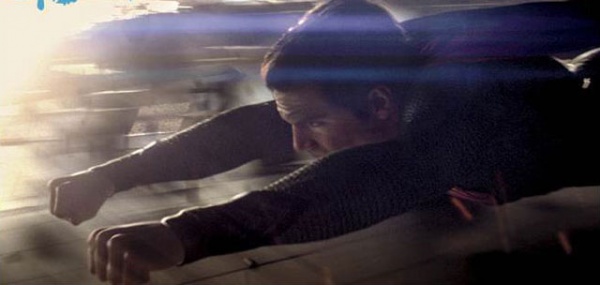
MAN OF STEEL is impossible to ignore on a technical level, but thematically it is a failure. Setting aside the question of fidelity to a well-established pop-culture character, this particular telling is dedicated to the notion that Kal-El, Clark Kent, Superman, these three aspects of the same identity merge as one, as the hero discovers and understands his true nature and then decides to act on it. However, the film strips away the potency of symbols. Even the big red S on Superman’s chest is dulled to a burnt crimson and explained away as the Kryptonian symbol for “hope.” But there is no hope for Krypton by the end of this film. Krypton is gone. The reason why the Superman myth has endured for so long is its emotional resonance – in many iterations, Ma Kent knits Clark’s costume for him, and the S most certainly stands for “Super,” a symbol that can be understood by the people protected by Superman, the people Superman is meant to inspire. When you take away these potent aspects of myth, you damn well better rebuild them with something equally potent. In MAN OF STEEL, Superman doesn’t protect Metropolis, he levels it. Are we supposed to look forward to his next adventure? What city is he going to rip up next? (Guess we know the answer to that now.)
Of course, of course, of course, there’s a side of avid moviegoers that revels in the sight of chaos and catastrophe. That’s why we love Clint Eastwood, and Bruce Lee, and King Kong. There’s an innate impulse in human beings, particularly those of us with higher levels of testosterone, to want to see fistfights and explosions. MAN OF STEEL plays to the impulse in little boys to destroy, to topple over building blocks and knock over little green army men. But Superman is supposed to make us want to put on a red cape and carry people. He’s supposed to remind us to stop being so awful, and to go out and be awesome.
@jonnyabomb
For further reading:
- [THE BIG QUESTION] WHAT’S YOUR FAVORITE FEMALE ENSEMBLE IN MOVIES? - July 22, 2016
- [IN THEATERS NOW] THE BOY (2016) - January 24, 2016
- Cult Movie Mania Releases Lucio Fulci Limited Edition VHS Sets - January 5, 2016
Tags: Man of Steel, Superman

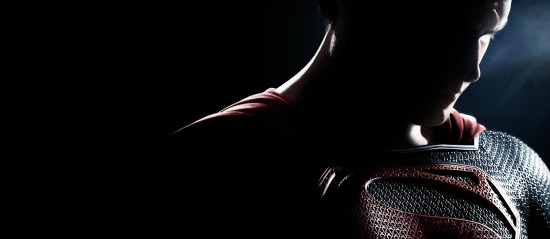




No Comments